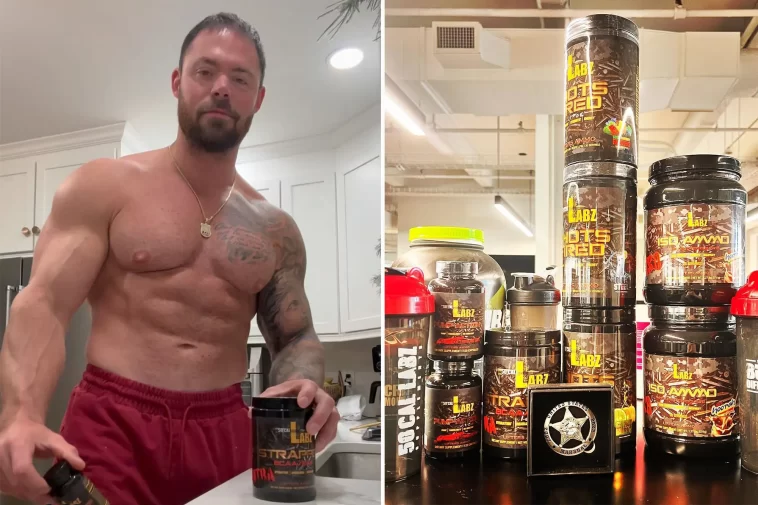The New York City Police Department (NYPD) has intensified its scrutiny on the use of certain health supplements by its officers commonly referred to as ‘flex offenders’.
The department has warned its personnel about potential repercussions, including termination, if they consume legal, over-the-counter muscle enhancers that subsequently result in a negative drug test, according to an obtained report. The officers are explicitly told in the notice that they are fully accountable for substances they consume, inject, or introduce into their bodies.
The notification, dispatched to all members on December 26, underscored the prohibition on anabolic steroids, human growth hormone (HGH), and nutritional supplements.
The directive, however, didn’t specify any particular brand or ingredient, only cautioning that such supplements could potentially contain ‘prohibited, banned, or illegal substances’ that could trigger a failed drug test result. The decision to issue the warning followed instances where officers who tested positive for banned substances justified their results by attributing them to workout supplements.
An insider in the law enforcement commented, ‘The message from the department is clear: non-prescribed steroid usage will not be excused any longer.
The ‘I was taking a workout supplement’ defense will no longer be acceptable if an officer tests positive for steroids without a valid prescription.’. The source further explained that an officer could potentially lose their job if they fail a drug test and can’t provide a legitimate prescription for the tested substance.
However, the directive has not been received without criticism. Some officers have expressed concerns over the potential ramifications of the order, particularly in relation to fitness and physical capability of the force. One officer argued that supplements could be a useful tool for officers struggling with weight issues, allowing them to maintain their physical fitness and endurance, crucial aspects in policing.
Detectives Endowment Association President, Paul DiGiacomo, echoed these sentiments, preferring an officer in good health capable of protecting themselves, their partners, and the public. While he agreed that the safety of the supplements is important, he criticized the policy for being intrusive, potentially forcing officers with valid prescriptions to disclose their personal medical information.
The union head, DiGiacomo, insisted that personal medical details should remain confidential. He stated, ‘The higher-ups demanding that detectives reveal their doctor-prescribed medication is a severe overstep. The union will employ all legal means necessary to halt this.’ Another officer raised the query, ‘If these supplements can be purchased over the counter by anyone, why should they be disallowed for police officers?’
Reportedly, the primary substances leading to positive drug tests among officers are broad-spectrum steroids and HGH. These substances are legal only when prescribed and are a significant cause for the department’s concerns. Steroids are known to induce aggressive behavior, dubbed ‘roid-rage’, which is primarily why the NYPD has prohibited them.
In addition to their psychological effects, steroids can also pose severe health risks, including serious liver damage, a life-threatening condition. For instance, testosterone, a legal steroid, could lead to punishment if an officer is discovered to have used it without a valid prescription, according to a law enforcement source.
The U.S. Food and Drug Administration (FDA) has found that some bodybuilding products may include steroids or steroid-like substances illegally. This can result in positive drug tests. Other substances found in nutritional supplements that are banned by sports organizations include methylhexaneamine, an amphetamine derivative marketed for weight loss that can cause heart attacks, and bumetanide, a prescription diuretic that can lead to severe dehydration and electrolyte imbalance.
In the NYPD, one of the most fit officers, Detective Edward Barrett, owns a business called 50 Cal Labz that produces workout supplements. Their offerings include products named ‘Ballistics Fat Burner’, ‘Shots Fired’ and ‘Strapped’. Barrett, working in the NYPD’s Warrant Section, states that his products are made in an FDA-approved facility and are safety-tested by an independent company.
Barrett started his company with the mission of helping first responders achieve better fitness levels. He promotes his grueling 1:30 a.m. workouts and ice baths via social media, and his stated goal is ‘to help other cops get fit.’ Despite being a supplement producer, he underlines that working out is more critical than any supplement use.
In online posts, calling himself ‘The Hardest Working Detective’, Barrett emphasizes that no supplement can replace hard work and discipline. Raising a health-conscious family, his three-year-old son Henry proudly declares, ‘Daddy goes to work to get the bad guys.’
He encourages fellow first responders to be cautious and informed about their nutritional intake. ‘You should pay attention to what you ingest,’ the diligent officer advises. ‘I trust mine because I am aware of their contents.’


